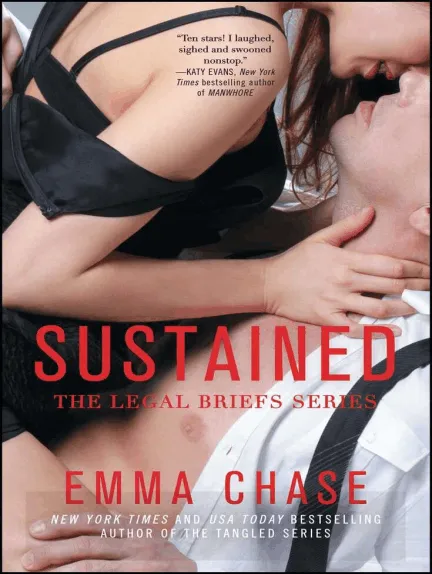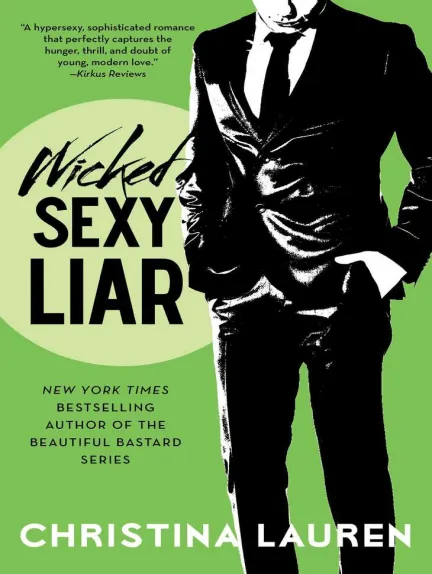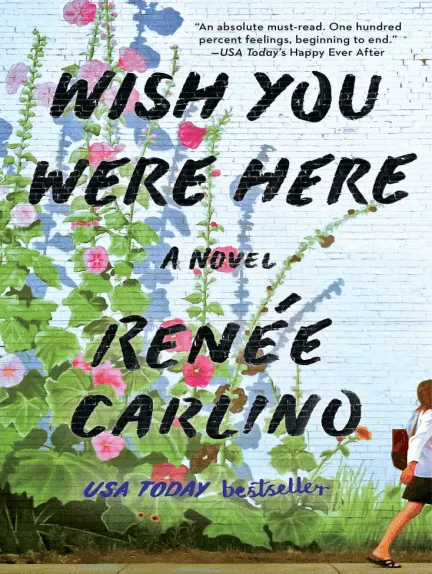It had started to rain—a thick drizzle that threatened to turn to snow—but in trying to remain optimistic, I’d packed my workout gear and running shoes anyway, hoping the weather would clear enough that I’d be able to squeeze in some time on the track.
My head always seemed to clear after a good run, and after days of subpar sleep and zero concentration, a clear head sounded pretty fucking great.
Could a brain become congested? I briefly considered asking Hanna the next time we were together, knowing she’d either (a) roll her eyes and suggest I wouldn’t know my brain from my ass, or (b) launch into some unnecessarily detailed scientific response. And although neither of those options sounded particularly helpful right now, they were both preferable to the situation in which we’d currently found ourselves: we hadn’t spoken in more than two weeks.
In essence, I had managed to screw things up with everyone.
Friday morning, I decided to drive to work, to listen to music and mull things over and have some space to myself. One weekend without talking to my sister was fine. Two felt terrible. I wasn’t sure I could do a third, and I wasn’t sure why I should. I didn’t exactly want to apologize, but I didn’t want to blame her for everything, either. The entire thing just felt shitty.
My car was silent save for the tap of drops against the hood and the nearly inaudible hum of the engine underneath. And because rush hour was a fucking nightmare, I had nothing but time without distraction to think about everything she’d said, everything I’d said, and how—really—she was totally right and I was a complete jackass.
Why, why, why did I drive today?
I remembered getting stuck in traffic on one of the first days of our trip. I was grinning and drunk on my new vacation high while Pippa concocted some story about each person in the cars around us: The man on our right had been plotting a bank robbery—it was obvious—Look at the bags under his eyes and the guilt all through his shoulders, look at the slouch on him! A frazzled mother with several children in the backseat was returning home from a birthday party, Pippa said, and the tiny smile we witnessed had been related to her just remembering a bottle of wine she bought the day before.
Now a woman in the black SUV on my left danced in her seat and sang along to whatever was playing on her radio. To my right, a man about my age had his eyes on the rearview mirror and his hands up in the air, gesturing wildly and talking to the children in the backseat. I’m sure their lives were fascinating . . . I just wasn’t nearly as good at making up stories about them as Pippa had been.
Still, her habit of daydreaming did seem to have rubbed off on me a little, because once she was in my head she stuck there, pushing away the uneasy thoughts of fighting with my sister. I found myself wondering about Pippa’s life in London, the way she’d once wondered about mine in Boston. Did she take the Tube to work? Did she walk? Did she have a car?
During holidays spent at home in college, I used to steal my dad’s keys all the time and drive around town late at night, sneak onto the football field with Will and drink beers until we fell asleep and woke up covered in dew and ants and had to drive home before anyone noticed the car was gone. Maybe teenage Pippa used to lift the keys to her mums’ car and chauffeur her friends around the streets of London. Maybe she used to make out with boys in the backseat and sing at the top of her lungs with the windows down and wind whipping through the car.
A horn blared off to the side and I blinked, startled out of my train of thought. I’d been spending more time than I expected thinking about what Pippa might be doing at any given moment. Especially considering things were supposed to be casual.
Right?
Despite leaving early, I was a half hour late to a staff meeting when I finally made it to the office. My day had been booked solid from eight thirty until six thirty, with a lunch meeting in the conference room.
I didn’t have time to do this—it was already after nine—but it didn’t matter: I wanted to call Hanna.
Standing up, I closed my office door and returned to my desk. I picked up my phone and dialed Hanna’s number, frowning when it switched over to voice mail. Fuck, of course. She was teaching.
“Zig—Hanna, it’s me. I’m at the office. Give me a call on my cell when you’re around. I have a pretty packed day, but maybe we can grab dinner, or do something this weekend? Love you.”
Hanging up, I grabbed my cell and walked down the hall toward the conference room, checking my emails as I went. There was one I didn’t recognize, an ox.ac.uk address, and it took me a moment to realize that it was from Ruby.
Hello Friend!
I wanted to pass along these photos from our trip! Hope things are well and that we see each other again soon.
xoxo
Ruby
Attached were several photographs she’d taken at various stops throughout our vacation, and I hesitated a little before opening them, wondering if I was really in the best mental place to be taking a walk down memory lane.
I risked it.
The first had been taken the day we’d arrived at Will and Ziggy’s, all bright smiles as we piled into the van. There were snapshots of us at the different tastings and dinners and on hikes, and of small candid moments as we laughed at something one of the others had said. It was interesting to watch the progression of my interactions with Pippa through photos. We’d started off so polite—straight backs, friendly smiles, plenty of personal space. But that was completely gone by the time we got to Vermont. No longer could I see the safe distance of strangers; in its place was the familiarity of friends turned to lovers, of arms looped around bodies and fingers intertwined. It was almost painful to see the way I looked at her, and when I opened a shot where Ruby had caught us emerging from the woods—eyes bright and cheeks flushed, hair and clothes askew—I closed my email app. It was hard enough right now to have these memories; I didn’t want to relive them on the screen, too.
Around one I gathered my things and headed for the large conference room on the second floor. My stomach growled at the scent of coffee filling the hallway and I realized I hadn’t eaten anything since breakfast.
I was reaching for a banana from the refreshment table when I felt a hand on my arm. It was my boss’s assistant, John. “Mr. Bergstrom. Mr. Avery would like a minute with you in his office before the meeting.”
I straightened and watched as he offered me a polite smile and turned, heading in the direction I was meant to follow. Sweat pricked at the back of my neck as I did. There were very few good reasons that Malcolm Avery would want to see me before the meeting, particularly when we were both supposed to be here, and everyone was filing in.
“Jensen,” Malcolm said, and closed the file he’d been working on. “Come in. I was hoping to take a few minutes to chat before we joined the meeting.”
“Of course,” I said, stepping inside his office.
He nodded to the door behind me. “Close that, if you don’t mind.”
The prickle of nerves turned into full-blown sweating.
A million things went through my mind—every possible thing I could have mishandled in the last few months—and I finally settled on the mess in London. Shit.
“Take a seat,” Malcolm said, straightening some papers in front of him before sitting back in his chair. “How are things going?”
“Good,” I said, and mentally filed through the cases I’d been working on, looking for the updates he’d most want to hear. “Walton Group should close later this month, Petersen Pharma by the end of the year.”
“And London?” he asked.
“There have been a few snags with the London office,” I said. He nodded, and I swallowed a lump in my throat. “Nothing we can’t handle, there’ll just be more follow-up than expec—”
“I know you’ve been tracking this,” he said. “I know the situation.”
Malcolm folded his hands on the desk in front of him and considered me for a moment. “Jensen, you know how things work around here. It isn’t enough these days to simply practice good law—almost anyone with a law degree can do that. What we need are associates and partners who make good money for the firm. Who instill confidence and bring in business. Who keep it. You know . . . when I was first starting out, I used to do a rough estimate of my profitability each month.”
My eyes widened and he smiled. “It’s true. I’d tally the hours I billed clients, then offset them against expenses my employer was incurring on my behalf—everything from the salary we paid my secretary to the cost of keeping the lights on in my office. We didn’t have computers back then, so I kept track of it all in a little notebook I kept tucked away in my suit coat pocket. I bought a client lunch, I added it. I needed a box of paperclips, I added it. I kept track of all those numbers because that way I knew when I was profitable, and I knew when I wasn’t. When I sat down with my boss I had it all there, in black and white, the things I was responsible for, the things I had impacted. One day he looked at me and said, ‘Anyone who is this anal-retentive needs to be on my side of the table.’ Shortly after that, I made partner.”
I nodded, not entirely sure where this was going. “Sounds like a great system.”
“I see the same drive, the same dedication in you,” he said. “Hours aren’t the only reason someone makes partner—though I’ve been assured you have more than your fair share, am I right?”
I nodded again. “I believe so.”
“It takes someone who can handle the important cases with professionalism and efficiency. It takes someone who drives the process, who manages interactions at every level with dexterity, who puts the best face forward for the firm and brings in new clients because they’ve heard such good things. Sure, there might be a snag here and there, such as with the London office, but it’s the people who recognize those snags and work to rectify them who stay in business. You build relationships, and manage the largest group in mergers, and still have the respect of your team.” He paused, leaning forward. “I bet if I asked, you have a little notebook of sorts of your own, don’t you?”
I did. I had a spreadsheet with every client I’d ever had, what I worked on and what we actually billed, from the day I was hired as an associate. “I do,” I said.
He laughed and slapped a hand against the desktop. “I knew it. And that’s why I’m going to recommend you as partner at this meeting we were supposed to join . . .”—he glanced up at the clock—“five minutes ago. Congratulations, Jensen.”
I slumped back into my couch and looked up at the ceiling. If my life was comprised of to-do lists—which, let’s be real, it sort of was—then the item listed at number one would have a bright red check next to it. After the meeting, I had an official offer of partner—I’d finally done it.
So what the hell was the problem? Instead of going out to celebrate with the rest of my team, or calling everyone I knew, I sat alone in my living room, staring at a blank wall.
I straightened my legs and placed them on the coffee table, taking another sip of my beer. I’d accomplished the thing I’d spent the whole of my adult life working toward, but instead of feeling satisfied, I felt restless. The whole thing was anticlimactic. I had essentially worked my way up the ladder to more work, more responsibility, more on my plate.
The second hand on my watch ticked in the silence. I wanted to talk about this with someone, because no doubt anyone in my life would be thrilled for me and would burst this numb bubble. I could call Hanna again; as a workaholic herself, she knew what it meant to be recognized and singled out for her work. But she hadn’t yet returned my call, and I didn’t want to push it if she was genuinely pissed at me.
My parents, as well, would be over the moon. After being married to Mom for nearly forty years, my dad knew more than any of us about the importance of balancing work with a life at home.
Life. Home.
The starkness of my bare walls had always been calming; an intentional contrast to the clutter of my office and the constant noise of phones ringing, voices shouting down the hall, shoes clicking on marble. Home had been my gentle, sterile place. It had been my retreat. But it suddenly felt completely lifeless.
And the more I thought about it, the more I knew that what was missing in my home was also missing everywhere in my life: Energy. Spontaneity. Sound and music, laughter and sex, mistakes and triumph.
With this clarity came the same feeling I’d had when I would wake up and see Pippa asleep on the pillow next to mine, or walk down the stairs in the Vermont house and see her long legs stretched out on the couch as she read. The sensation was that giddy tightening, that nearly painful punch a heart gives when it’s got something to say.
I missed her. I wanted her. I wanted her here with me—or me with her—and I wanted to find that joy with the small things she seemed to have mastered.
I missed the wild, thrill-ride sound of her laugh and the way she scrunched her nose when someone used the word moist. I missed the way she would slowly draw letters and clouds and spirals on my back when I rested over her, catching my breath. I missed the way it felt to be inside her, but more than that, I missed the way it felt to be with her. Not doing anything, really, just . . . being together.
Standing, I jogged upstairs, pulled down the first suitcase I could find, and began throwing things inside: shirts, pants, boxers. I swiped the contents of the bathroom cupboard into the bag and closed it with a sharp click.
I didn’t know what I would say when I got there—or what she would say in return—so I repeated the same words over and over in my mind: I love you. I know it was supposed to be casual, but it’s not. I want to figure the rest out.
It occurred to me as I merged onto I-90 that I didn’t even have a flight booked to London. Laughing, I directed my phone to call the Delta reservations line. Cars sped by on either side of me, and within just a few minutes, my call rang through.
“Hello,” the woman said in a cheerful, helpful voice. “We’ve recognized your call from your phone number. Can you confirm your home address?”
I rattled it off, catching the urgency in my own voice.
She hummed into the line, asking what I needed, where I was flying, when I wanted to leave. If my last-minute inquiry to fly across the Atlantic was anything out of the ordinary, she didn’t let on. “And the date you’d be returning?”
I paused; I hadn’t considered that part. Taking work or any other kind of responsibility out of the equation, the best outcome I could hope for would be to stay for a week—maybe two—before going home. Hopefully we’d return together, or at the very least with some kind of understanding between us and a plan to move forward. I could do waiting. I could do patient.
What I didn’t seem to be handling very well was settling for Ring me when you come to London.
“I’d like to leave that open,” I said.
“No problem,” the woman said, and then, as if sensing my worry, she finished with, “We do these all the time. Do you know which cabin you’d prefer, Mr. Bergstrom?”
“It doesn’t matter,” I told her. “As long as I’m on the flight.”
“Okay.” More keystroke clicks. “And would you—” She paused for a moment and I found myself looking up at the speaker, worrying that I’d lost the call.
“Hello?”
“Yes, sorry,” she said, coming back. “Would you be interested in using miles?”
“Miles?”
“Yes, you have, um, quite a few,” she said, and then laughed. “Nearly eight hundred thousand, actually.”
London was gray as ever upon our descent, but once we’d dropped below the clouds we could see Tower Bridge and the London Eye, the River Thames as it snaked its way through the streets. My nerves, having dissipated somewhat during the long flight, sparked to life again as the whole city came into view.
The Shard reminded me of a story Pippa told us about visiting the observation deck on the seventy-second floor and how hilarious she thought it was that there was a Yelp page where people could “voice their disapproval of the view.”
Seeing Wembley Stadium reminded me of Pippa describing a concert she’d seen there, how being in the stadium with her eyes closed, surrounded by ninety thousand people while the music beat through every bone in her body, was as close to pure bliss as she’d ever been.
I wanted to be the one at her side when she experienced her next moment like that.
I felt reenergized as we deplaned and headed through the terminal, through customs, and finally toward baggage. The routine felt so natural, so normal, that it freed up my brain to imagine—a hundred times—how it might feel walking to her flat, or meeting her in her corner pub, or simply running into her on the sidewalk. I’d been practicing my little speech, but I was beginning to realize that it didn’t really matter what I said when I saw her. If she wanted me, we’d figure the rest out.
I felt like the guy in the movie, on a mission and hoping he hadn’t realized how he felt far too late.
The organized chaos of Heathrow buzzed around me and I found a quiet corner just off the baggage terminal. It was chilly and damp next to a set of automatic doors, and I set down my bags, pulling my phone from my pocket.
Opening her contact information, I burst out laughing once I saw the thumbnail picture beside her name. It was a photo she’d taken at the Jedediah Hawkins Inn early on in the trip. In it, she was grimacing, lips pushed out, eyes crossed. Ruby had said we needed to add everyone into our contacts, and Pippa had taken the worst selfie, sending it around once she had all of our numbers.
Just below her photo was her address. It was early afternoon on Saturday; I didn’t know whether she would be home or out with friends, but I had to try. Walking outside, I hailed a cab.
The streets grew narrower as the taxi made its way from the M4 and into the city. I watched from the backseat as we passed rows of tiny houses and apartments fashioned at odd angles. Most of the trees were bare this time of year, and the knobby trunks grew up and out from the cobbled sidewalks to stand starkly against gray brick.
People lingered outside pubs, pints in their hands as they chatted or watched a game on the televisions just inside. We drove past more people sitting together at sidewalk cafés, or jogging into coffee shops to get their Saturday fix. I imagined the life Pippa and I might have here, if that’s what she wanted: meeting friends at the corner pub or stopping by the neighborhood market for groceries for dinner.
I knew it was dangerous to start going down the path of fantasy, but I couldn’t really help it. I hadn’t seen her in nearly a month—hadn’t spoken to her in that long, either. If it felt this shitty now, imagine how it would be to never speak to her again.
As a wave of nausea hit me, the taxi stopped in front of a narrow brick building. I paid the driver, retrieved my bag, and climbed out. Staring up to the windows on the third floor, it occurred to me that if all went well, I could sleep with her in my arms tonight.
I checked the address again and verified the flat number before I began climbing the stairs.
She might not be here.
And it would be fine.
I’d wait at the café on the corner, or take the Tube to Hyde Park and walk around for a few hours.
I knocked on the door to her flat, and my heart vaulted up into my throat at the sound of heavy footsteps.
I thought I’d been prepared for anything. I was wrong.
The man at Pippa’s door looked at me with wide blue eyes. Dark curly hair hung in braids over his shoulders, and a ribbon of smoke spiraled from the cigarette in his hand.
I opened my mouth, stunned. “. . . Mark?” I asked.
He blew out a long curl of thick smoke before picking a bit of tobacco off his lip. “Who?”
“Are you . . . Mark?” I said again, quieter this time. “Or—is Pippa? Is she here? I think this is her flat.” I looked down to the paper in my hand to double check.
“Nah, mate,” he said. “Don’t know Pippa, or Mark. Just moved in m’self. Bird that lived here moved out a week ago.”
I nodded numbly and thanked him, turning back down the hall.
Pippa moved?
I took the stairs slowly, one at a time.
I don’t know why I was surprised that I didn’t know this. It’s not like we’d been in touch. But it had only been a few weeks since she’d left. She must have moved out . . . immediately.
Reaching for my phone, I found her contact picture again and pressed it.
My stomach was in knots as it rang once, and then once again, finally connecting to a series of knocks and muffled sounds, as if someone had dropped the phone on the other end. The steady thump of music pulsed through the line and into my ear.
“Cheers!” someone shouted into the receiver, and I narrowed my eyes, trying to identify her voice in a sea of many others.
“Pippa?”
“Oi? I can’t really hear you. Speak up, yeah?”
“Pippa, this is Jensen. Are you home? I just got—”
“Jensen! Long time, mate! And home? Nah, not till later. How are you?”
“Well, I’m—the reason I’m calling—”
“Listen, I’ll try and ring you tomorrow. I can’t hear a thing!”
I paused, staring blindly at the road ahead of me as the line went dead. “Sure, of course.”
As if things couldn’t get worse, I quickly realized that I’d been so hopeful I’d see Pippa and that things would work out that it hadn’t occurred to me to book any sort of hotel in case that didn’t happen.
I found a taxi on the street outside her flat and the driver waited while I booked a room using my phone. After she dropped me off, I had dinner by myself in a small pub on the corner, and the entire time, I refused to acknowledge the possibility that I had made a huge, presumptuous mistake.
She’ll call in the morning, I told myself.
But she didn’t call in the morning, even though I checked continually while working a bit at the London office, under the pretense of visiting to straighten things out. She didn’t call in the afternoon, either, and when I called again that night it went straight to a generic voice mail greeting. I left her a message and kept my ringer on, near the bed, just in case she called.
I tried the next morning—voice mail—and again—leaving another message. I didn’t have her email address, and Ruby hadn’t yet answered my email asking for help contacting Pippa. By my third night there, it was time to admit defeat.
With my single bag repacked, I checked out of the hotel and took a cab to the airport.
My flight was easy enough to book, and knowing I would probably have as much scotch as I could stomach and then sleep the rest of the way home, I used as many miles as it took and booked a first-class return ticket, straight to Boston.
I found an isolated seat in the corner of the lounge in the terminal, careful to keep my eyes down and my earbuds in, not wanting to talk to anyone. Hanna texted during my second scotch and soda but I ignored it, unwilling to admit to her that I had taken a leap of faith, and had crashed and burned spectacularly.
I knew she would be proud of me for trying, and would do whatever she could to cheer me up, but for now I wanted to wallow. Either Pippa had never wanted more, or she had but I’d been too thick to see it at the time.
They announced my flight over the speaker in the lounge, and I emptied my glass, grabbing my duffel before making my way out to the gate.
The usual crowd had begun to gather around the podium as they awaited their zone, and I joined the line, halfheartedly returning the agent’s smile as I scanned my ticket and then proceeded down the jetway.
Footsteps shuffled in front of me and I moved on autopilot as I made my way onto the plane and down the aisle, stopping at my designated row.
When I looked up, it felt like the floor had come out from under my feet.
I took a deep breath and opened my mouth, and from the torrent of words and speeches that rolled around in my head, only a single one managed to make its way out.
“Hi.”




















